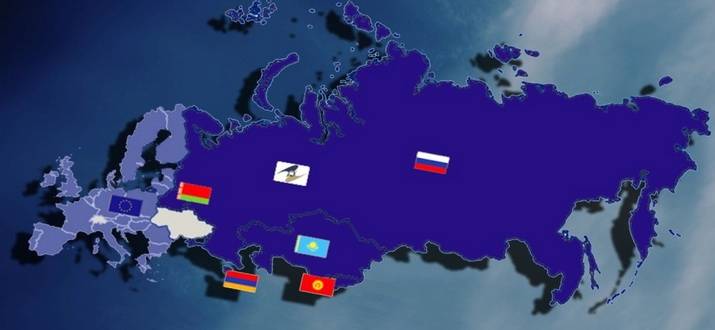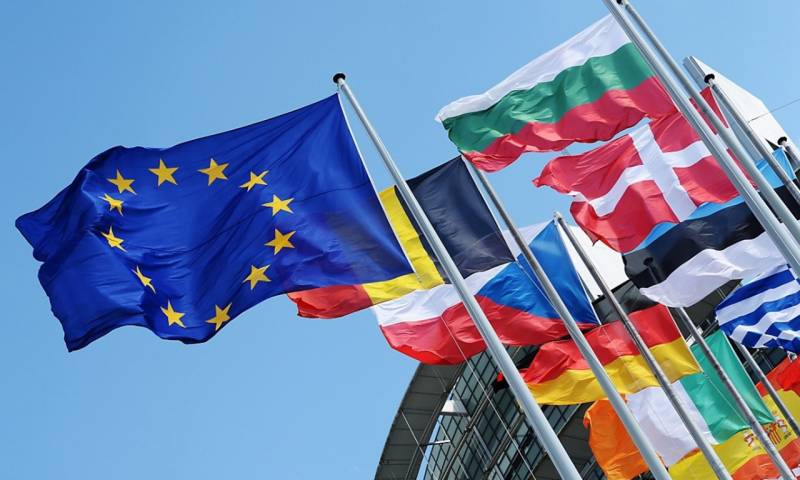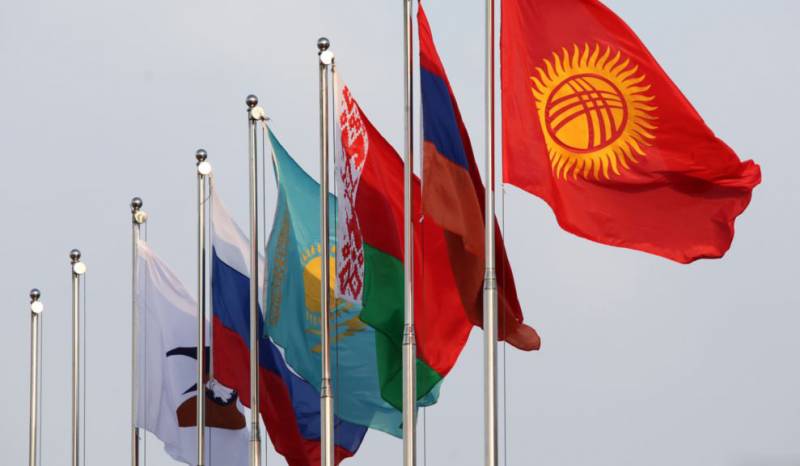EU and EAEU: if partnership, then unequal
Experts from the ECE do not get tired of reminding their European colleagues that they drown a great idea in small things and details. Indeed, much earlier, the Europeans directly suggested the Russian permanent representative to the EU Vladimir Chizhov, who gave an interview to the authoritative EU Observer, to go for rapprochement. The diplomat noted: “We strive to begin official contacts between the EU and the EAEU as soon as possible. German Chancellor Angela Merkel spoke about this not so long ago. EU sanctions against Russia are not a hindrance here. I think common sense dictates that we should take the opportunity to build a common economic space in the Eurasian region. ” “We need to think about creating a trade zone that covers all interested parties in Eurasia,” the diplomat said.
Not political contradictions constantly threaten the unity of a united Europe. In this regard, the Eurasian association, where they deliberately distance themselves from the Soviet legacy, is only gaining integration momentum. But it seems that in case of a closer rapprochement, the EAEU risks being on the verge of collapse even faster than the EU. And at the same time, paradoxically, both of them can keep afloat by deepening cooperation just among themselves.
At the same time, Russia's leadership in the EAEU remains indisputable, and even only potential cooperation with the Eurasian integration structure, other than a step towards “disgraced” Russia, cannot be perceived in Europe. Germany’s leadership in the EU is not so obvious, but partners always look back at it. And perhaps, the establishment of Brussels is now the most straining of the fact that many countries, not from among the leaders of the EU, have already expressed interest in rapprochement with a united Eurasia. And this, instead of continuing the very fruitless discussions that the Eurasians simply suggested that they should be bracketed.
There is one more important difference between the two structures. The EU was created on a historically divided continent, which is why economic foundations laid first and foremost its foundation. At the same time, in any approach, the EAEU inherits too much from the USSR to neglect. And in economic terms, above all, although citizens are far more important deep cultural and interpersonal ties. By definition, in accordance with the initial agreements on its creation, the EAEU is a Union that imposes only the most minimal restrictions on key economic and political decisions of member countries. The main thing here, as in the Hippocratic Oath, is “do no harm” to your partner. Tax and other maneuvers are not regulated by anything, only customs practice is strictly agreed, and even more so no one tries to influence the policies of the neighbors, both external and internal.
This is the strength of the union, and its weakness. The strength is that it was generally formed after many years of fruitless negotiations on the ruins of the former USSR. Weakness in limiting the possibilities of much closer rapprochement, which is, for example, in the Union State of Russia and Belarus. Given all this, there is hardly any need to repeat that there is no in the EAEU and, in the foreseeable future, there will be no political component.
The Center for the Study of Integration Prospects does not exclude that it was a mistake for the EEC to enter into a possible dialogue with the European Union another message, which at first glance can play the role of a locomotive, but in fact only slowed down the negotiation process. This is a somewhat general condition for maintaining the open position of the Eurasian Union in relation to interaction with the EU. And the essence of the condition itself is the recognition of the EAEU as an institutionally symmetrical to the EU structure. It seems to be not equal, namely, a symmetric EU, but even then, the cunning Europeans, as we see, diligently set about looking for political connotations. Moreover, it turned out that the Europeans simply have no incentives for such recognition. And in such cases, the European bureaucracy acts extremely pragmatically - if we don’t need it, we don’t recognize it.
The initiative of the Eurasians does not go beyond the framework of such a “modest” point; it takes into account not only the current difficult situation of the EU, but also the general state of European politics and economy. However, whether there are more chances for this that the EEC will hear now - there are doubts. In practice, the European Council continues to adhere to the strategy of non-recognition of the Eurasian Economic Union as an entity. Although the volume of competencies of the EEC, raw materials and markets of the EAEU countries could be a significant help for the European Union. And although membership in the EAEU itself implies a kind of drift, if not in the fairway, then by parallel courses with Russia, but this does not in the least prevent even the “first settlers” of the new Union to retain the freedom of political maneuver.
As a result, Russian specialists in the International Affairs Council, as well as many of their Eurasian counterparts from the EEC, can only wonder how Belarus and Kazakhstan sometimes occupy positions that they are unfriendly to their senior partner with no reason. However, drawing parallels between the EU and the EEU, we will not rush to the opposite definition, but the Russians should not forget that sometimes it is much more harm from a false friend than from an enemy. Remember, in spite of the fact that all attempts, through political manipulations, to turn the EAEU member countries against Russia, to push them with Moscow (the most obvious were such attempts with respect to Kazakhstan) did not yield any truly significant result. But after all, it is impossible to exclude such attempts at all.
Despite the formal “non-recognition”, many in Europe have long understood that the EAEU is not a temporary, but quite a stable organization, and a straightforward alternative to the EU or the EAEU, more precisely, only the CU (Customs Union), which Ukraine offered at one time turned out to be, in fact, an absolutely false premise. Yes, there are politicians in the EU who still do not lose hope that serious economic concessions from the EEU countries can be achieved through political manipulations. No, trying to improve relations, bypassing Russia, no one has the right to prohibit, but it’s about manipulation, the desire to extract some unreasonable dividends.
However, with the advent of the EAEU, this kind of manipulation requires not only making too much effort. We need, for example, truly enormous resources, which the EU simply does not have (and probably will not, judging by economic statistics). We need political will, which the current leaders of the EU do not have either, but whether those who will replace them will also have a question. Finally, a long-term strategy is needed for countries that once belonged to the USSR and left it without special approval from the people.

On the other hand, it seems that not only Russians, but also Europeans, have recently got a good idea about the limits to which Russia and Europe can run up relatively painlessly lately. Moreover, they and Washington made it clear that cooperation with Europe has ceased to be an absolute value for the United States, although it is sometimes called strategic. It is unlikely that rapprochement now contributes to the fact that while the countries of the EEU, unlike the European Union, as a rule, act in relation to foreign markets in an inconsistent manner, mainly one by one. The existence of the Union there is remembered only when they fall into serious conflict situations.
Hence the conclusion: the transformation of the very perception of the EAEU exclusively in the trade bloc, and the transfer of the Union to a new quality level, are now becoming the main integration task of Moscow. With full distancing from politics, it should obviously be a question of much higher investment activity of the EAEU, the conjugation with it of a number of spaces that are under the wave of regionalization, not only economic, but also, as a result, political and cultural. Otherwise, the current global economy simply does not survive. In China, it seemed to have been understood for a long time when, without paying any attention to political contradictions, they became the center of economic, and not only, attraction for all of Southeast Asia.
It is difficult to say whether Russia is ready to dominate in the same way, it reacts too differently to the numerous challenges associated with the EAEU. But Russian business most often looks at the structure itself only as an additional investment reservoir. And this is exactly what is faced by the same unpreparedness of the EU countries to somehow force a real recognition of the EAEU by a symmetrical structure, first of all, in institutional terms. This will in fact become a fact of recognition that there is a valid alternative model of economic integration, compared to which even the BRICS union, even if it has its own bank, is clearly fading.
As a sufficiently powerful center of gravity, the EEU is now considered early, although at first the process of creating free trade zones with a number of countries was very brisk. The EEU does not claim and cannot claim any geopolitical role. But if the European Union recognizes the “symmetry” of the EEU, its members will have free hands for negotiations in a variety of integration formats with partners who are ready to work with both the EU and the EEU. This, as it should be recalled, is not only Syria, Iran or Egypt, but also China, and India, and even South Korea.
The Europeans seem to be greatly embarrassed by the prospect of the need, in the event of a transition to the EU-EAEU dialogue, to negotiate on equal terms with everyone at once. But it is just that sometimes easier. Yes, it will be necessary to speak with Eurasians in the same way as Europeans have been taught to speak with the same Americans, then with Russians, more precisely - with the Soviets, then with the Japanese and Chinese. That is, at a completely different level, openly, being responsible for words and even more so for deeds. And if Europeans are so eager to feel like another pole of a multipolar world, even if they prove it by deed. And for some reason, they are not trying to convince Russia of multi-polarity, which is actively opposing the unipolar Pax Americana.
It is clear that it is through the EEU of Russia that it will now be more convenient to break the notorious negative background, or rather the trend, which a significant proportion of European politicians have chosen for it. Because of it, both regional and sectoral contacts have drastically decreased, air is even pumped out of relations from below. And so far there are no serious hints to ensure that relations with the countries of the EEU fill at least part of the resulting vacuum.
At the same time, there are a lot of people in Russia who are now even ready to rub their hands: they say, Russia has learned to live without Europe. Firstly, this is not entirely true, or rather, not at all, although if for some time Eurasianism reigns in Russia and neighboring countries, Europe may even benefit from this. After all, to live within the narrow limits of even such a wonderful old continent as Europe, and even in friendship with Russia, is in any case to limit itself in many ways. And precisely starting from the economic penetration into the big Eurasia through Russia, the Europeans can give additional powerful incentives to the development of their stagnating integration structure. And it's not so scary to let go of the UK.


Information